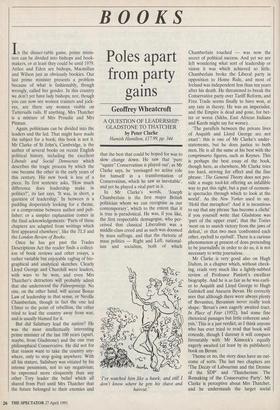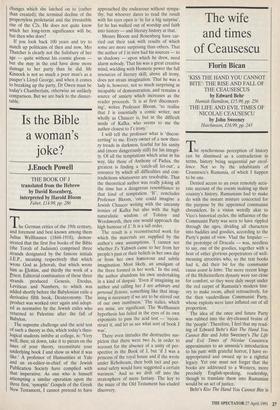BOOKS
Poles apart from party gains
Geoffrey Wheatcroft
A QUESTION OF LEADERSHIP: GLADSTONE TO THATCHER by Peter Clarke Hamish Hamilton, £17.99, pp. 344 In the dinner-table game, prime minis- ters can be divided into bishops and book- makers, or at least they could be until 1979. Attlee and Eden are bishops, Macmillan and Wilson just as obviously bookies. Our last prime minister presents a problem because of what is fashionably, though wrongly, called her gender. In this country we don't yet have lady bishops; nor, though you can now see women trainers and jock- eys, are there any women visible on Tattersalls rails. If anything, Mrs Thatcher is a mixture of Mrs Proudie and Mrs Pitman.
Again, politicians can be divided into the leaders and the led. That might have made the subject for a book; this book is not it. Mr Clarke of St John's, Cambridge, is the author of several books on recent English political history, including the excellent Liberals and Social Democrats which describes the tragic process by which the one became the other in the early years of this century. His new book is less of a piece. Its first sentence asks, 'How much difference does leadership make in politics?', its last says, 'It was, in short, a question of leadership.' In between is a pudding desperately looking for a theme, or a compromise between author and pub- lisher; or a simpler explanation comes in the final acknowledgements: 'Parts of these chapters are adapted from writings which first appeared elsewhere', like the TLS and the London Review of Books.
Once he has got past the Trades Descriptions Act the reader finds a collect- ion of book reviews and other essays, a rather variable but enjoyable ragbag of bio- graphical and analytical sketches. Clearly Lloyd George and Churchill were leaders, with wars to be won, and even Mrs Thatcher's detractors will probably admit that she understood the Fiihrerprinzip. No one, on the other hand, will accuse Bonar Law of leadership in that sense, or Neville Chamberlain, though in fact the one led Ulster to the point of rebellion, the other tried to lead the country away from war, and is usually blamed for it.
But did Salisbury lead the nation? He was the most intellectually interesting prime minister of the last 100 years (apart, maybe, from Gladstone) and the one true philosophical Conservative. He did not for that reason want to take the country any- where, only to stop going anywhere. With all his stature, Salisbury was vitiated by his intense pessimism, not to say negativism; he expressed more eloquently than any other Tory leader the belief which all shared from Peel until Mrs Thatcher that the future belonged to their enemies and that the best that could be hoped for was to slow change down. He saw that 'pure "squire" Conservatism is played out'; as Mr Clarke says, he 'envisaged no active role for himself in a transformation of Conservatism, which he saw as inevitable', and yet he played a vital part in it.
In Mr Clarke's words, 'Joseph Chamberlain is the first major British politician whom we can recognise as our contemporary', which to the extent that it is true is paradoxical. He was, if you like, the first respectable demagogue, who per- ceived that classical Liberalism was a middle-class creed and as such was doomed by mass suffrage, and that the rhetoric of mass politics — Right and Left, national- ism and socialism, both of which 'I've watched him like a hawk, and still I don't know where he gets his shave and haircut.' Chamberlain touched — was now the secret of political success. And yet we are left wondering what sort of leadership or vision it was which achieved so little. Chamberlain broke the Liberal party in opposition to Home Rule, and most of Ireland was independent less than ten years after his death. He threatened to break the Conservative party over Tariff Reform, and Free Trade seems finally to have won, at any rate in theory. He was an imperialist, and the Empire is dead and gone, for bet- ter or worse (Sikhs, East African Indians and Kurds might say for worse).
`The parallels between the private lives of Asquith and Lloyd George are not exact': this is one of Mr Clarke's under- statements, but he does justice to both men. He is all the same at his best with the comprimario figures, such as Keynes. This is perhaps the best essay of the book, though here, as elsewhere, Mr Clarke tries too hard, striving for effect and the fine phrase: ' The General Theory does not pro- vide a magic tool-kit offering an infallible way to put this right, but a pair of econom- ic spectacles through which to look at the world'. As the New Yorker used to say, `Hold that metaphor!' And it is incautious to say that any phrase 'has become a cliché' if you yourself write that Gladstone was `part of the upper crust', that the Tories `went on to snatch victory from the jaws of defeat,' or that two men 'confronted each other, eyeball to eyeball'. There is a curious phenomenon at present of dons pretending to be journalists; in order to do so, it is not necessary to write journalese.
Mr Clarke is very good also on Hugh Dalton, in a chapter which, without check- ing, reads very much like a lightly-subbed review of Professor Pimlott's excellent biography. And he is as fair as he was earli- er to Asquith and Lloyd George to Hugh Gaitskell and Aneurin Bevan. He correctly sees that although there were always plenty of Bevanites, Bevanism never really took shape: Sevan's own eagerly awaited tract, In Place of Fear (1952), had some fine rhetorical passages but little coherent anal- ysis.' This is a just verdict, as I think anyone who has ever tried to read that book will concede, though I daresay it will compare favourably with Mr Kinnock's equally eagerly awaited (at least by its publishers) book on Bevan.
Theme or no, the story does have an out- come of sorts. The last two chapters are `The Decay of Labourism and the Demise of the SDP' and `Thatcherism: The Remaking of the Conservative Party'. Mr Clarke is perceptive about Mrs Thatcher, and he understands the larger social changes which she latched on to (rather than created); the terminal decline of the propertyless proletariat and the irresistible rise of the C2s. He does not quite know which her long-term significance will be, but then who does?
If you look back 100 years and try to match up politicans of then and now, Mrs Thatcher is clearly not the Salisbury of her age — quite without his cosmic gloom but she may in the end have done more damage to her party than he did. Mr Kinnock is not so much a poor man's as a pauper's Lloyd George, and when it comes to breaking up the party, Dr Owen must be today's Chamberlain, otherwise an unlikely comparison. But we are back to the dinner- table.



















































 Previous page
Previous page